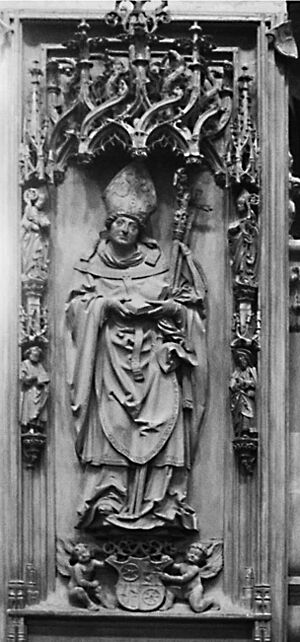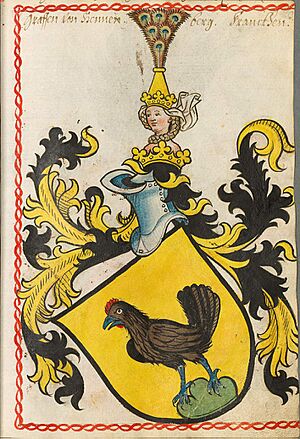Berthold von Henneberg facts for kids
Quick facts for kids Berthold von Henneberg |
|
|---|---|
| Archbishop of Mainz | |

Tomb monument of Berthold von Henneberg in the Mainz Cathedral, attributed to Hans Backoffen (1455–1519).
|
|
| Church | Catholic Church |
| Diocese | Electorate of Mainz |
| In Office | 1484–1504 |
| Personal details | |
| Born | 1442 |
| Died | 21 December 1504 |
Bertold von Henneberg-Römhild (1442–1504) was a very important person in the Holy Roman Empire. He was the Archbishop of Mainz and a powerful Prince-elector starting in 1484. He also became the empire's chancellor in 1486. Bertold was known as a leader who wanted to make big changes and improvements within the empire.
Contents
Berthold von Henneberg: A Leader for Change
Bertold von Henneberg was born in 1442. His father was George, a Count of Henneberg. His mother was Johanna, the daughter of Count Philipp I of Nassau-Weilburg. Bertold studied at the University of Erfurt.
Early Life and Becoming Archbishop
Bertold decided to join the church. He slowly moved up through different roles. By 1472, he was a member of the important Mainz cathedral chapter. He became the dean there in 1475.
On May 20, 1484, Bertold was chosen to be the Archbishop of Mainz. This was confirmed by Pope Innocent VIII a few months later. In 1486, he became the imperial chancellor. This happened because he supported Maximilian I to become the new emperor.
Working for Peace and Order
Bertold believed in new ideas from the Renaissance humanism movement. He was a strong supporter of law and order. He worked hard to stop bad practices within the church. He was also a careful leader of his own area.
Soon after becoming archbishop, Bertold started to play a big role in the empire's business. In 1486, he worked very hard to make sure Maximilian of Habsburg was elected as the King of the Romans. This was a very important step for Maximilian to become emperor.
The Imperial Reform Movement
Bertold von Henneberg is best remembered for wanting to improve how the empire was run. He pushed for something called the Ewiger Landfriede. This means "eternal public peace." The idea was to stop all fighting and feuds between different parts of the empire. This peace would be kept by a special court called the Imperial Chamber Court.
Bertold brought up these ideas many times at the Reichstag (a big meeting of leaders). At first, his ideas didn't work. But he kept trying. After Emperor Frederick III died, Bertold became the main leader of the group that wanted reforms.
Challenges and Legacy
At the Diet of Worms in 1495, Bertold pushed Maximilian to accept the "eternal public peace." This was a big victory. He also encouraged the different states in the empire to work together, like the Swiss Confederacy did.
In 1500, at another Reichstag in Augsburg, Bertold had another success. A council of regency called the Reichsregiment was set up. Bertold was in charge of this council. It meant the emperor had less power, and Bertold and other powerful princes had more.
However, this victory didn't last long. The Reichsregiment was ended by Maximilian in 1502. Bertold's group, called the Electoral League, lost. Other princes in the empire didn't trust them enough. In 1503, Bertold returned the imperial seal. This showed that he had been defeated in his efforts for reform.
Bertold von Henneberg died on December 21, 1504. He is buried in the Mainz Cathedral. A beautiful monument there reminds everyone of his important work.
 | Aaron Henry |
 | T. R. M. Howard |
 | Jesse Jackson |


